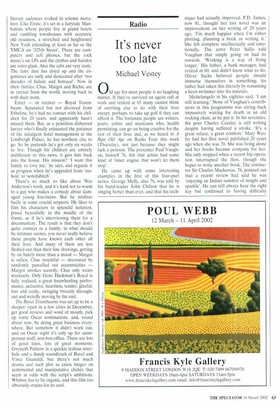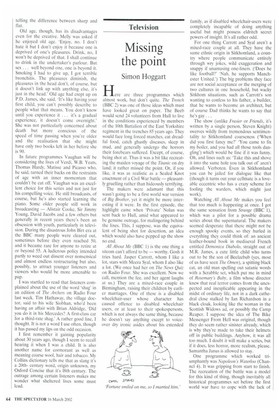Radio
It's never too late
Michael Vestey
0 Id age for most people is no laughing matter. If they've survived an ageist cull at work and retired at 65 many cannot think of anything else to do with their lives except, perhaps, to take up golf if they can afford it. The fortunate people are writers, poets, artists and musicians who, health permitting, can go on being creative for the rest of their lives and, as we heard in A Ripe Old Age on Radio Four this week (Thursday), not just because they might lack a pension. The presenter Paul Vaughan, himself 76, felt that artists had some kind of 'inner engine that won't let them stop'.
He came up with some interesting examples in the first of this four-part series. George Melly, also 76, was told by his band-leader John Chilton that he is singing better than ever, and that his tech nique had actually improved. P.D. James, now 81, thought her last novel was an improvement on her writing of 20 years ago. 'I'm much happier when I'm either plotting, planning a book or writing it.' She felt complete intellectually and emotionally. The actor Peter Sallis told Vaughan that simply going on had its rewards. 'Working is a way of living longer.' His father, a bank manager, had retired at 60, and didn't know what to do. Oliver Sachs believed people should immerse themselves in something; his father had taken this literally by remaining a keen swimmer into his nineties.
Michelangelo in his eighties said, 'I am still learning.' None of Vaughan's contributors in this programme was sitting back impassively waiting for death in an old rocking chair, as he put it. In his seventies, the poet Charles Causley is still writing despite having suffered a stroke. 'It's a great solace, a great comfort.' Mary Wesley had her first novel published 20 years ago when she was 70. She was living alone and her books became company for her. She only stopped when a recent hip operation interrupted the flow, though she hopes to write another book. The conductor Sir Charles Mackerras, 76, pointed out that a recent review had said he was 'enjoying an Indian summer of insight and sparkle'. He can still always hear the right key but confessed to having difficulty telling the difference between sharp and flat.
Old age, though, has its disadvantages even for the creative. Melly was asked if he enjoyed old age. 'Enjoy. no. I don't hate it but I don't enjoy it because one is deprived of one's pleasures. Drink, no, I won't be deprived of that. I shall continue to drink in the undertaker's parlour. But sex .. well beyond one, one is beyond it. Smoking I had to give up, I got terrible bronchitis. The pleasures diminish, the pleasures in the head don't, of course, but it doesn't link up with anything else, it's just in the head.' Old age had crept up on P.D. James, she said. 'It's like having your first child, you can't possibly describe to people what that means. You don't know until you experience it . . it's a gradual experience, it doesn't come overnight.' She was not particularly concerned about death but more conscious of the speed of time passing when you're older and the realisation that she might have only two books left in her before she is 90.
In future programmes Vaughan will be considering the lives of Verdi, W.B. Yeats, Thomas Hardy, Matisse and Picasso who, he said, turned their backs on the restraints of age with an inner momentum that couldn't be cut off. Vaughan was an excellent choice for this series and not just for his compelling voice. He still broadcasts, of course, but he's also started learning the piano. Some older people still work in broadcasting — Alistair Cooke, Sir Jimmy Young, David Jacobs and a few others but generally in recent years there's been an obsession with youth, particularly in television. During the disastrous John Birt era at the BBC many people were cleared out, sometimes before they even reached 50, and it became rare for anyone to retire at or beyond 55. A ludicrous policy intended partly to weed out dissent over nonsensical and almost endless restructuring but also, possibly, to attract younger listeners and viewers who would be more amenable to pap.
I was startled to read that listeners complained about the use of the word 'shag' in an edition of The Archers on Radio Four last week. Tim Hathaway, the village doctor, said to his wife Siobhan, who'd been having an affair with Brian Aldridge, 'Did you do it in his Mercedes? A first-class car for a third-rate shag.' A rather good line, I thought. It is not a word I use often, though it has passed my lips on the odd occasion.
I first remember it gaining popularity about 30 years ago, though I seem to recall hearing it when I was a child. It is also another name for cormorant as well as meaning coarse wool, hair and tobacco. My Collins dictionary tells me that as slang it's a 20thcentury word, origin unknown, my Oxford Concise that it's 18th century. The outrage among certain listeners makes me wonder what sheltered lives some must lead.

















































































 Previous page
Previous page